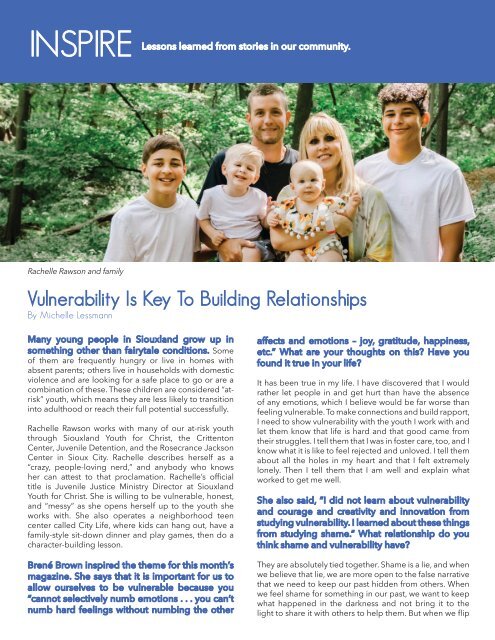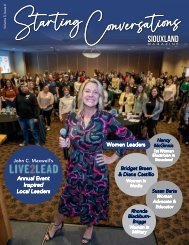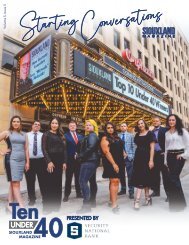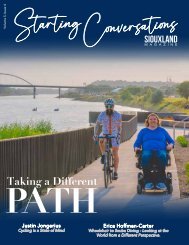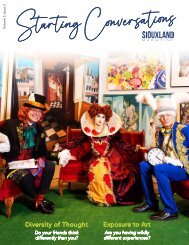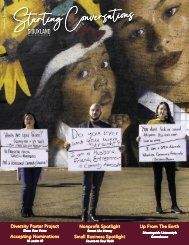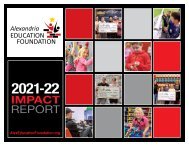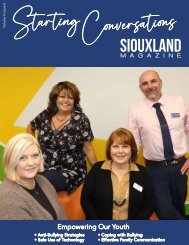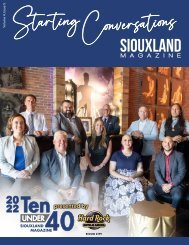Siouxland Magazine - Volume 3 Issue 3
You also want an ePaper? Increase the reach of your titles
YUMPU automatically turns print PDFs into web optimized ePapers that Google loves.
Inspire<br />
Lessons learned from stories in our community.<br />
Rachelle Rawson and family<br />
Vulnerability Is Key To Building Relationships<br />
By Michelle Lessmann<br />
Many young people in <strong>Siouxland</strong> grow up in<br />
something other than fairytale conditions. Some<br />
of them are frequently hungry or live in homes with<br />
absent parents; others live in households with domestic<br />
violence and are looking for a safe place to go or are a<br />
combination of these. These children are considered “atrisk”<br />
youth, which means they are less likely to transition<br />
into adulthood or reach their full potential successfully.<br />
Rachelle Rawson works with many of our at-risk youth<br />
through <strong>Siouxland</strong> Youth for Christ, the Crittenton<br />
Center, Juvenile Detention, and the Rosecrance Jackson<br />
Center in Sioux City. Rachelle describes herself as a<br />
“crazy, people-loving nerd,” and anybody who knows<br />
her can attest to that proclamation. Rachelle’s official<br />
title is Juvenile Justice Ministry Director at <strong>Siouxland</strong><br />
Youth for Christ. She is willing to be vulnerable, honest,<br />
and “messy” as she opens herself up to the youth she<br />
works with. She also operates a neighborhood teen<br />
center called City Life, where kids can hang out, have a<br />
family-style sit-down dinner and play games, then do a<br />
character-building lesson.<br />
Brené Brown inspired the theme for this month’s<br />
magazine. She says that it is important for us to<br />
allow ourselves to be vulnerable because you<br />
“cannot selectively numb emotions . . . you can’t<br />
numb hard feelings without numbing the other<br />
affects and emotions – joy, gratitude, happiness,<br />
etc.” What are your thoughts on this? Have you<br />
found it true in your life?<br />
It has been true in my life. I have discovered that I would<br />
rather let people in and get hurt than have the absence<br />
of any emotions, which I believe would be far worse than<br />
feeling vulnerable. To make connections and build rapport,<br />
I need to show vulnerability with the youth I work with and<br />
let them know that life is hard and that good came from<br />
their struggles. I tell them that I was in foster care, too, and I<br />
know what it is like to feel rejected and unloved. I tell them<br />
about all the holes in my heart and that I felt extremely<br />
lonely. Then I tell them that I am well and explain what<br />
worked to get me well.<br />
She also said, “I did not learn about vulnerability<br />
and courage and creativity and innovation from<br />
studying vulnerability. I learned about these things<br />
from studying shame.” What relationship do you<br />
think shame and vulnerability have?<br />
They are absolutely tied together. Shame is a lie, and when<br />
we believe that lie, we are more open to the false narrative<br />
that we need to keep our past hidden from others. When<br />
we feel shame for something in our past, we want to keep<br />
what happened in the darkness and not bring it to the<br />
light to share it with others to help them. But when we flip


